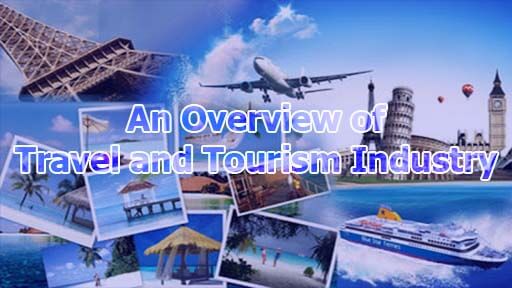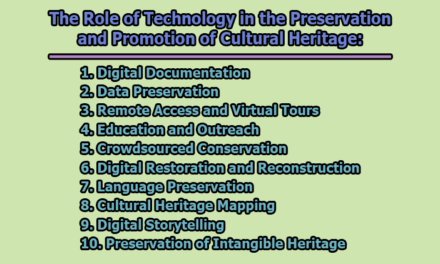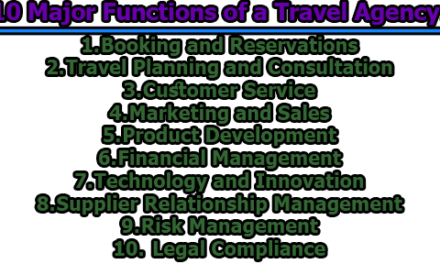An Overview of the Travel and Tourism Industry:
The travel and tourism industry refers to a collection of businesses and organizations that offer products and services to people who are traveling away from their homes for leisure, business, or other purposes. This industry includes a wide range of activities, such as transportation, accommodation, food and beverage services, attractions, and travel services. The travel and tourism industry is a complex and multifaceted sector that plays an essential role in promoting economic growth, cultural exchange, and global connectivity. In the rest of this article, we are going to present you with an overview of the travel and tourism industry.
What is the Tourism Industry?
The tourism industry encompasses all economic activities related to the production and consumption of goods and services by tourists. This includes transportation, accommodation, food and beverage, attractions, and entertainment. (UNWTO, 2021)
The tourism industry comprises businesses and organizations that provide products and services to travelers, including transportation, accommodation, food and beverage, and attractions. It is a significant contributor to the global economy, creating jobs and generating revenue for many countries and communities. (WTTC, 2021)
The tourism industry is a network of businesses and organizations that facilitate travel and tourism. It includes transportation providers, hotels, restaurants, attractions, and tour operators, among others. The tourism industry is an essential sector of the global economy, contributing to economic growth and promoting cultural exchange and understanding. (ILO, 2021)
The tourism industry comprises a range of activities related to the travel and stay of individuals and groups in places outside their usual environment for leisure, business, or other purposes. This includes transportation, accommodation, food and beverage, attractions, and entertainment. The tourism industry is a crucial driver of economic growth, creating jobs and generating revenue for many countries and communities. (OECD, 2021)
What is the Travel Industry?
The travel industry comprises businesses and organizations that provide products and services to travelers, including transportation, accommodation, travel agencies, and tour operators. It is a significant contributor to the global economy, creating jobs and generating revenue for many countries and communities. (WTTC, 2021)
The travel industry refers to a network of businesses and organizations that facilitate travel, including airlines, hotels, car rental companies, and travel agencies. It is a crucial sector of the global economy, providing jobs and generating revenue for many countries and communities. (UNWTO, 2021)
The travel industry encompasses a range of businesses and services that facilitate travel, including transportation providers, accommodation providers, and tour operators. The travel industry is a critical sector of the global economy, contributing to economic growth and promoting cultural exchange and understanding. (ILO, 2021)
The travel industry comprises various activities related to the movement of people from one place to another for leisure, business, or other purposes. This includes transportation, accommodation, travel agencies, and tour operators. The travel industry is a crucial driver of economic growth, creating jobs and generating revenue for many countries and communities. (OECD, 2021)
Travel vs Tourism Industry:
Some of the comparisons of the travel and tourism industry are given below:
| Key points | Travel Industry | Tourism Industry |
| Definition | A network of businesses and services that facilitate travel, including transportation providers, accommodation providers, and tour operators. | All economic activities related to the production and consumption of goods and services by tourists, including transportation, accommodation, food and beverage, attractions, and entertainment. |
| Focus | Movement of people from one place to another for leisure, business, or other purposes. | Meeting the needs of tourists, including transportation, accommodation, food and beverage, attractions, and entertainment. |
| Purpose | Facilitates travel and transportation services. | Provides products and services to tourists. |
| Scope | Narrower in focus, concerned with the movement of people from one place to another. | Broader in focus, concerned with all economic activities related to tourism. |
| Examples | Airlines, car rental companies, and travel agencies. | Hotels, resorts, restaurants, attractions, and tour operators. |
It is important to note that while the travel industry and tourism industries have distinct differences, they are also closely interrelated and often work together to provide travelers with a seamless and enjoyable experience.
Sectors and Companies within the Travel and Tourism Industry:
Here’s a brief overview of the sectors and companies within the travel and tourism industry:
- Transportation: The transportation sector is a crucial part of the travel and tourism industry, as it enables travelers to move from one place to another. This sector includes several sub-sectors, such as:
- Airline Industry: The airline industry is responsible for providing air transport services for passengers and cargo. Major players in the industry include Delta Air Lines, American Airlines, United Airlines, and Emirates, among others.
- Car Rental: Car rental companies provide rental cars to travelers who need transportation during their trip. Major players in the car rental industry include Avis Budget Group, Enterprise Holdings, and Hertz Global Holdings.
- Water Transport: Water transport includes services such as ferries, cruises, and water taxis. Major players in this sector include Carnival Corporation, Royal Caribbean Group, and Norwegian Cruise Line Holdings.
- Coach Services: Coach services provide transportation by bus or coach. Major players in this sector include Greyhound Lines, Inc. and Megabus.
- Railway: Railway companies provide transportation by train. Major players in this sector include Amtrak, Deutsche Bahn, and Eurostar.
- Spacecraft: Spacecraft transportation is a relatively new sub-sector of the travel and tourism industry, with companies such as Virgin Galactic and Blue Origin offering space tourism experiences.
- Accommodation: The accommodation sector provides travelers with a place to stay during their trip. This sector includes several sub-sectors, such as:
- Hotels: Hotels offer accommodations for travelers, ranging from budget options to luxury resorts. Major players in the hotel industry include Marriott International, Hilton Worldwide Holdings, and Accor.
- Shared Accommodation: Shared accommodation platforms, such as Airbnb and Vrbo, allow travelers to book stays in private homes, apartments, or rooms.
- Hostels: Hostels offer budget accommodation, often with shared facilities such as bathrooms and kitchens. Major players in the hostel industry include Hostelling International and Generator Hostels.
- Camping: Camping provides an affordable outdoor accommodation option for travelers. Companies such as Kampgrounds of America and Yogi Bear’s Jellystone Park Camp-Resorts provide camping options in various locations.
- Bed and Breakfast: Bed and breakfast establishments offer lodging and breakfast for guests. This sector includes both small independent properties and larger chains, such as Four Seasons Hotels and Resorts.
- Cruises: Cruise ships offer accommodation, food and beverage, entertainment, and transportation services all in one package. Major players in the cruise industry include Carnival Corporation, Royal Caribbean Group, and Norwegian Cruise Line Holdings.
- Farmhouse Accommodation and Agri-Tourism: Farmhouse accommodation and agri-tourism offer unique accommodation experiences, allowing travelers to stay on working farms and learn about agricultural practices. Companies such as Farm Stay UK and Agritourism World offer listings of these types of accommodations.
- Timeshare Accommodation: Timeshare accommodations allow travelers to purchase or rent a share of a vacation property for a set period each year. Major players in the timeshare industry include Wyndham Destinations and Marriott Vacations Worldwide.
- Food & Beverage: The food and beverage sector provides travelers with options for dining and drinking during their trip. This sector includes several sub-sectors, such as:
- Restaurants: Restaurants offer a variety of dining options, ranging from fast food to fine dining. Major players in the restaurant industry include McDonald’s, Yum! Brands (which owns KFC, Taco Bell, and Pizza Hut), and Starbucks.
- Catering: Catering services provide food and beverage for events such as weddings, conferences, and business meetings. Companies such as Aramark and Compass Group are major players in the catering industry.
- Bars & Cafés: Bars and cafés provide options for travelers to relax and socialize, often serving alcoholic beverages and light meals. Major players in this sector include Starbucks, Costa Coffee, and Café Coffee Day.
- Nightclubs: Nightclubs offer entertainment options for travelers, often featuring live music and dancing. Major players in the nightclub industry include Hakkasan Group and LIV at Fontainebleau.
- Entertainment: The entertainment sector provides travelers with options for leisure activities during their trips. This sector includes several sub-sectors, such as:
- Casino: Casinos offer gambling and entertainment options for travelers, often featuring table games, slot machines, and live performances. Major players in the casino industry include MGM Resorts International, Caesars Entertainment, and Las Vegas Sands.
- Tourist Information: Tourist information services provide information and assistance to travelers, often including maps, brochures, and recommendations for local attractions. Major players in this sector include VisitBritain and the National Tourist Offices of various countries.
- Shopping: Shopping provides travelers with options for purchasing souvenirs and gifts, as well as clothing, electronics, and other goods. Major players in this sector include shopping malls and outlets, such as Westfield and Tanger Factory Outlet Centers.
- Tourist Guides & Tours: Tourist guides and tours offer travelers guided experiences of local attractions, often providing historical and cultural context. Major players in this sector include Viator and TripAdvisor Experiences.
- Connected Industries: The connected industries sector includes businesses that support the travel and tourism industry, such as:
- Financial Services: Financial services include banks, credit card companies, and payment processors that facilitate financial transactions for travelers. Major players in this sector include Visa, Mastercard, and American Express.
- Travel Agents: Travel agents provide assistance to travelers with booking flights, accommodations, and other travel services. Major players in this sector include Expedia Group and Booking Holdings.
- Tour Operators: Tour operators offer pre-packaged tours and experiences for travelers, often including transportation, accommodations, and activities. Major players in this sector include TUI Group and Thomas Cook Group.
- Online Travel Agencies: Online travel agencies offer a one-stop shop for travelers to book flights, accommodations, and other travel services online. Major players in this sector include Expedia Group and Booking Holdings.
- Tourism Organizations: Tourism organizations promote destinations and attractions to travelers, often working in partnership with local governments and businesses. Major players in this sector include Visit Britain and Visit California.
- Educational: Educational businesses offer opportunities for travelers to learn new skills and knowledge, often related to the local culture and history. This sector includes language schools, cooking schools, and other educational experiences. Major players in this sector include EF Education First and Cactus Language Training.
In summary, the travel and tourism industry is a diverse and interconnected network of sectors and companies that provide travelers with a wide range of services and experiences. From transportation and accommodation to dining, entertainment, and beyond, the industry plays a crucial role in facilitating global travel and cultural exchange.
Travel and Tourism Marketing:
Travel and tourism marketing refers to the strategies and tactics used by businesses in the travel and tourism industry to promote their products and services to potential customers. Effective marketing is essential in this industry, as it helps businesses to differentiate themselves from competitors and attract travelers to their offerings.
a. Marketing Strategies: The travel and tourism industry employs a wide range of marketing strategies to reach potential customers. Some of the most common strategies include:
- Advertising: Advertising is a key component of many travel and tourism marketing campaigns. Advertisements can be placed in various media channels, including print, television, radio, and online. Advertisements can be used to promote destinations, accommodations, attractions, and other travel-related products and services.
- Public Relations: Public relations (PR) involves managing a business’s reputation and relationships with stakeholders, including customers, media outlets, and industry influencers. PR strategies can include media relations, event planning, and crisis management.
- Social Media: Social media has become an increasingly important marketing channel in the travel and tourism industry. Social media platforms like Facebook, Instagram, and Twitter allow businesses to engage with customers, promote their offerings, and showcase customer experiences through user-generated content.
- Content Marketing: Content marketing involves creating and sharing content that is designed to attract and engage potential customers. Examples of content marketing in the travel and tourism industry include travel guides, blog posts, and social media content.
- Influencer Marketing: Influencer marketing involves partnering with social media influencers to promote travel and tourism products and services. Influencers can include travel bloggers, vloggers, and social media personalities with large followings.
b. Target Market: In order to create effective marketing campaigns, businesses in the travel and tourism industry must first identify their target market. A target market is a specific group of customers that a business is trying to reach. Different businesses in the industry may have different target markets depending on the products and services they offer.
For example, a luxury hotel may target high-end travelers who are looking for a premium experience, while a budget airline may target price-sensitive travelers who are looking for affordable airfare. Other factors that may influence a business’s target market include age, gender, income level, geographic location, and travel preferences.
c. Marketing Mix: The marketing mix refers to the set of tools and tactics that businesses use to promote their products and services. The marketing mix includes four key elements, known as the “4 Ps”: product, price, place, and promotion.
- Product: In the travel and tourism industry, the product refers to the range of offerings that a business provides to customers. This can include accommodations, transportation, attractions, and other travel-related products and services.
- Price: The price of travel and tourism offerings can vary widely depending on factors like seasonality, demand, and competition. Businesses must carefully consider pricing strategies in order to attract customers while still maintaining profitability.
- Place: The place refers to the channels through which travel and tourism products and services are sold to customers. This can include online travel agencies, direct bookings through a business’s website, or traditional travel agents.
- Promotion: Promotion refers to the tactics used to promote travel and tourism products and services to potential customers. This can include advertising, public relations, social media, content marketing, and other strategies.
d. Importance of Branding: Branding is a key component of marketing in the travel and tourism industry. A business’s brand is the way that it is perceived by customers and stakeholders. A strong brand can help a business to differentiate itself from competitors and create a loyal customer base.
In the travel and tourism industry, branding can include everything from a business’s logo and website design to its customer service and the overall guest experience. A strong brand can help a business to stand out in a crowded marketplace and attract customers who are looking for a specific type of experience or level of service.
e. Customer Experience: Customer experience is a critical factor in the success of any travel and tourism business. Marketing efforts can attract potential customers, but the quality of the customer experience can determine whether they will return in the future or recommend the business to others.
In order to create a positive customer experience, travel and tourism businesses must focus on factors like customer service, amenities, and overall guest satisfaction. This can include offering personalized service, providing convenient amenities like free Wi-Fi or shuttle service, and ensuring that the guest rooms and common areas are clean and well-maintained.
In addition to creating a positive customer experience, businesses in the travel and tourism industry must also focus on managing negative reviews and feedback. This can involve responding to customer complaints in a timely and professional manner, offering refunds or compensation when appropriate, and taking steps to address any underlying issues that may be causing customer dissatisfaction.
f. Technology in Tourism Marketing: Technology is an increasingly important component of marketing in the travel and tourism industry. Advances in technology have led to the development of new marketing channels and tactics, as well as tools that can help businesses to analyze customer data and optimize their marketing efforts. Some of the most important technologies for tourism marketing include:
- Online Booking Systems: Online booking systems allow customers to book travel and tourism products and services directly through a business’s website. This can include accommodations, transportation, and attractions.
- Customer Relationship Management (CRM) Systems: CRM systems allow businesses to track customer interactions and data, including booking history and preferences. This data can be used to create targeted marketing campaigns and personalized customer experiences.
- Augmented Reality (AR) and Virtual Reality (VR): AR and VR technologies can be used to create immersive experiences for potential customers, allowing them to “try before they buy” and get a sense of what a destination or attraction has to offer.
- Big Data Analytics: Big data analytics can help businesses to analyze customer data and identify patterns and trends that can inform marketing strategies. This can include data on customer demographics, preferences, and behavior.
Overall, Effective marketing is essential for success in the travel and tourism industry. Businesses in this industry must use a variety of marketing channels and tactics to attract potential customers, create positive customer experiences, and differentiate themselves from competitors. By focusing on factors like branding, customer service, and technology, businesses can create successful marketing campaigns that drive bookings and revenue.
How Tourism Industry can Achieve Success with Revenue Management:
Revenue management is a key concept in the travel and tourism industry, and it involves maximizing revenue by optimizing pricing, inventory, and distribution strategies. In order to achieve success with revenue management, businesses in the tourism industry must have a deep understanding of market demand, consumer behavior, and pricing dynamics. Here are some ways that the tourism industry can achieve success with revenue management:
- Utilize Dynamic Pricing Strategies: Dynamic pricing involves adjusting prices in real time based on market demand, competitor pricing, and other factors. This can help businesses to maximize revenue by charging higher prices during peak periods and lower prices during off-peak periods.
- Offer Personalized Pricing and Packages: Personalized pricing and packages can help businesses to target specific customer segments and increase revenue. This can include offering discounts to loyal customers, bundling products and services together, and creating customized packages based on customer preferences.
- Optimize Inventory Management: Inventory management involves balancing supply and demand in order to maximize revenue. This can include managing room availability, allocating inventory across different channels, and implementing overbooking strategies to ensure maximum occupancy.
- Implement Distribution Strategies: Distribution strategies involve determining the best channels for distributing products and services. This can include partnering with online travel agencies, using social media and other digital marketing channels, and optimizing distribution across different markets.
- Analyze Customer Data: Analyzing customer data can help businesses to understand consumer behavior and preferences, and create targeted marketing campaigns and personalized customer experiences. This can include analyzing booking history, demographics, and online behavior.
- Use Revenue Management Software: Revenue management software can help businesses to automate and optimize revenue management strategies. This can include forecasting demand, optimizing pricing, and managing inventory across different channels.
Implementing revenue management strategies requires a deep understanding of market dynamics and consumer behavior. By utilizing dynamic pricing, offering personalized pricing and packages, optimizing inventory management, implementing distribution strategies, analyzing customer data, and using revenue management software, businesses in the tourism industry can achieve success with revenue management and increase their revenue and profitability.

Library Lecturer at Nurul Amin Degree College










